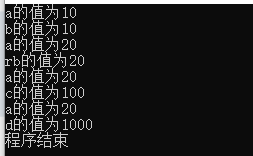C++/CLI——2类和对象生存期
C++/CLI——2函数与类的使用方法
函数使用
定义函数和使用函数基本与C#相同,只不过C++/CLI可以像标准C++一样,可以先声明函数原型,再定义函数主体。值得注意的是,如果有默认参数,只能在函数原型中定义,不能在函数主体中重复定义。
#include "pch.h"
using namespace System;
//函数原型
double GetResult(double a=1, double b=1);
//函数主体
double GetResult(double a, double b)
{
return a + b;
}
//调用函数
int main(array<System::String^>^ args)
{
double r = GetResult(100);
Console::WriteLine(r);
return 0;
}
C++/CLI中的语句如if、switch、while、for、do while等,均与C#用法相同。
类和对象
定义类
和标准C++一样,在.h头文件中声明原型,在.cpp源文件中定义实现。使用::表示C++作用域解析符,->表示调用成员操作符。
案例:
//头文件
#pragma once
ref class CreditCardAccount
{
public:
CreditCardAccount();
CreditCardAccount(long number, double balance, double limit);
static CreditCardAccount();//静态类构造器
void SetCreditLimit(double amount);
bool MakePurchase(double amount);
void MakeRepayment(double amount);
void PrintStatement();
long GetAccountNumber();
static int GetNumberOfAccounts();
private:
long accountNumber;
double currentBalance;
double creditLimit;
static int NumberOfAccounts;
};
源文件
#include "pch.h"
#include "CreditCardAccount.h"
using namespace System;
CreditCardAccount::CreditCardAccount()
{
}
静态类构造器
static CreditCardAccount::CreditCardAccount()
{
}
//成员初始化列表
CreditCardAccount::CreditCardAccount(long number, double balance, double limit):accountNumber(number), currentBalance(balance), creditLimit(limit)
{
}
void CreditCardAccount::SetCreditLimit(double amount)
{
creditLimit = amount;
}
bool CreditCardAccount::MakePurchase(double amount)
{
if (currentBalance +amount>creditLimit)
{
return false;
}
else
{
currentBalance += amount;
return true;
}
}
void CreditCardAccount::MakeRepayment(double amount)
{
currentBalance -= amount;
}
void CreditCardAccount::PrintStatement()
{
Console::WriteLine(currentBalance);
}
long CreditCardAccount::GetAccountNumber()
{
return accountNumber;
}
//此时没有static,只有在函数原型时含有static
int CreditCardAccount::GetNumberOfAccounts()
{
return 0;
}
调用
#include "pch.h"
#include "CreditCardAccount.h"
using namespace System;
int main(array<System::String^>^ args)
{
CreditCardAccount^ myAccount = gcnew CreditCardAccount();
myAccount->SetCreditLimit(1000);
myAccount->MakePurchase(1000);
myAccount->PrintStatement();
long num = myAccount->GetAccountNumber();
Console::WriteLine(num);
}
类构造器
不同于标准C++,C++/CLI支持静态构造器,普通构造器是在对象创建时初始化实例成员,而静态构造器是在类可以使用前完成一些准备工作,这意味着在创建类的任何对象,或者在使用类的任何静态成员之前都会先调用类静态构造函数。
//h文件
ref class CreditCardAccount
{
public:
static CreditCardAccount();
};
//cpp文件
static CreditCardAccount::CreditCardAccount()
{
}
类级常量
类级常量代表在类的所有实例中都不变的值,可以使用literal关键字来创建
literal string^ name ="hello";
在标准的C++中可以使用static const来表示类级别常量,虽然C++/CLI也支持这样写,但是如果类时通过一个#using语句来访问,这种常量不被认为是编译时常量,所以推荐使用literal。
实例常量
可以用initonly关键字来标记实例常量,也就是在创建类的实例时由构造器赋值,之后就不能更改。
对象生存期
C++/CLI中垃圾回收器(GC)来清理不需要的对象,垃圾回收器有三点要注意:
- 对象总是通过句柄来管理,这是系统跟踪对象的方式
- 只要有一个句柄指向对象,该对象就不会被回收
- 无法判断对象的内存在什么时候回收,这有GC来决定
垃圾回收器有一个原则越老的对象存活时间越长,因为gc有“代”的概念,0代满了就对0代进行回收,幸存下来的对象提升到1代,目前gc只支持3代。
析构器
标准C++和C#都具有析构器,只不过C#中的析构器不能显式调用,C++/CLI定义方式与之相同,使用方法和标准C++类似,使用delete来调用析构器
ref class MyClass
{
public:
MyClass();
~MyClass();
};
int main(array<System::String^>^ args)
{
MyClass^ c = gcnew MyClass();
delete c;
}
终结器
垃圾回收器回收对象时调用的是终结器,如果使用了非托管资源,则要定义终结器,如果未使用非托管资源,则一般不需要定义终结器,与C#中的析构器类似,不能显式调用。
ref class MyClass
{
public:
MyClass();
!MyClass();
};
终结期的三个原则:
- 不要定义什么都不做的终结器,因为一旦定义了,GC就会在回收对象的内存中执行,这会有性能损耗
- 终结期的顺序不能确定,如A和B都有终结器,且都对同一数据进行操作,这是无法确定谁先执行的
- 如果整个应用程序已经终止,仍然存活的对象不会再调用终结器,这包括后台线程使用的对象,或者在终结器中创建的对象。
案例
ref class MyClass
{
public:
MyClass(String^ name);
~MyClass();
!MyClass();
void DoSomething();
private:
String^ name;
};
MyClass::MyClass(String^ name)
{
this->name = name;
Console::WriteLine("构造函数已调用:{0}", name);
}
MyClass::~MyClass()
{
Console::WriteLine("析构函数调用");
}
MyClass::!MyClass()
{
Console::WriteLine("终结期调用");
}
void MyClass::DoSomething()
{
Console::WriteLine("调用方法");
}
int main(array<System::String^>^ args)
{
MyClass^ m1 = gcnew MyClass("hello");
m1->DoSomething();
Console::WriteLine("程序结束");
}

修改案例
如果在调用时,显式调用delete
int main(array<System::String^>^ args)
{
MyClass^ m1 = gcnew MyClass("hello");
m1->DoSomething();
delete m1;
Console::WriteLine("程序结束");
}

此时程序没有调用终结器,因为垃圾回收器认为析构器执行完成后,对象已经得到清理,不需要执行终结器,所以一般要在析构器中显式调用终结器。
MyClass::~MyClass()
{
Console::WriteLine("析构函数调用");
this->!MyClass();
}
在编写C++/cli程序时,要养成使用对象完毕后调用delete的习惯
栈语义
标准C++中,可以在栈上直接创建对象
MyClass m("dd");
m.DoSomething();
这样在离开作用域后会自动销毁,因为是在栈上定义的对象,所以说对象具有栈的语义
C++/CLI支持相同的方式,不过,实际上并不是在栈上声明,只是为了兼容C++的写法,目前大多数类型对象都支持栈语义,除了字符串和数组,这些对象必须使用gcnew来获得。
拷贝构造器
标准C++的内存管理严重依赖拷贝构造器,如果没有定义则默认提供一个拷贝构造器,但是C++/CLI有了GC,并不会默认提供一个拷贝构造函数,而是需要自己写。
MyClass^ a = gcnew MyClass();
MyClass^ b =a;
如何像上面这样写,则b和a其实指向的是同一个对象,拷贝的只是句柄而不是拷贝指向的对象。如果要完全拷贝,则要提供拷贝构造器。
ref class MyClass
{
public:
MyClass(const MyClass% other);
private:
String^ name;
int value;
};
MyClass::MyClass(const MyClass% other)
{
value = other.value;
name = other.name;
}
%指定了一个跟踪引用,句柄间接引用对象,使用->操作符访问成员,而跟踪引用只是变量的别名,是变量的另一个名字。类似于标准C++中的引用,只不过为了应对GC操作,C++/CLI的引用为%。
int i =5;
int %j = i;
拷贝构造函数一般使用const来修饰参数,这样做的好处主要有2个:
- 引用不产生新的变量,减少形参与实参传递时的开销
- 由于引用可能导致实参随形参改变而改变,将其定义为常量引用可以消除这种副作用
与标准C++一样,C++/Cli也提供了*解引用符
MyClass^ m = gcnew MyClass();
//rm其实和和m其实是指向了同一个对象
MyClass% rm = *m;
// mm是具有语义栈的对象,其实是调用了拷贝构造器
MyClass mm=*m;
案例
ref class MyClass
{
public:
MyClass(const MyClass% other);
MyClass(int v);
int GetValue();
Void SetValue(int v);
private:
int value;
};
MyClass::MyClass(const MyClass% other)
{
value = other.value;
}
MyClass::MyClass(int v)
{
value = v;
}
int MyClass::GetValue()
{
return value;
}
Void MyClass::SetValue(int v)
{
value = v;
}
int main(array<System::String^>^ args)
{
MyClass^ a = gcnew MyClass(1);
MyClass^ b = a;//仅仅拷贝句柄
b->SetValue(10);
Console::WriteLine("a的值为{0}", a->GetValue());
Console::WriteLine("b的值为{0}", b->GetValue());
MyClass% rb = *a;//只是用了跟踪引用
rb.SetValue(20);
Console::WriteLine("a的值为{0}", a->GetValue());
Console::WriteLine("rb的值为{0}", rb.GetValue());
MyClass c = *a;//创建新对象,并把它作为a所指对象的拷贝
c.SetValue(100);
Console::WriteLine("a的值为{0}", a->GetValue());
Console::WriteLine("c的值为{0}", c.GetValue());
MyClass^ d = gcnew MyClass(*a);//直接调用拷贝构造器
d->SetValue(1000);
Console::WriteLine("a的值为{0}", a->GetValue());
Console::WriteLine("d的值为{0}", d->GetValue());
Console::WriteLine("程序结束");
}

对象和栈语义关联
对象经常由其他对象构成,包含对象可以使用栈的语义来声明,也可以使用句柄来声明。在使用栈的语义来声明时,包含对象是在调用构造函数之前构造的,而析构器正好相反。那如何选择是使用栈的语义声明还是句柄来声明,要处理以下几个问题:
- 包含对象是否是容器对象的一部分,是否能独立存在;
- 包含对象是否要与其他对象共享;
- 包含对象是否可以与其他对象交换;
- 包含对象是否在容器对象销毁后可以继续存活;
如果这几个都不满足,则优先使用栈的语义声明方式。
本文来自互联网用户投稿,该文观点仅代表作者本人,不代表本站立场。本站仅提供信息存储空间服务,不拥有所有权,不承担相关法律责任。 如若内容造成侵权/违法违规/事实不符,请联系我的编程经验分享网邮箱:chenni525@qq.com进行投诉反馈,一经查实,立即删除!
- Python教程
- 深入理解 MySQL 中的 HAVING 关键字和聚合函数
- Qt之QChar编码(1)
- MyBatis入门基础篇
- 用Python脚本实现FFmpeg批量转换
- sentinel控制面板dashboard的下载安装教程
- 【Java SE】基础知识回顾——【10.数据结构 | List集合】
- 电动汽车转子油冷电机
- 比例化简C语言
- 把树状数组在页面显示成‘/‘/‘形式,并搜索想要的值
- Spring-整合MyBatis
- java 日期格式转换 2023-11-29T02:38:43.031Z
- java读取含有合并单元格的Excel
- uniapp小程序appid调用失败
- 中介者和访问者模式(行为型设计模式)的 C++ 代码示例模板